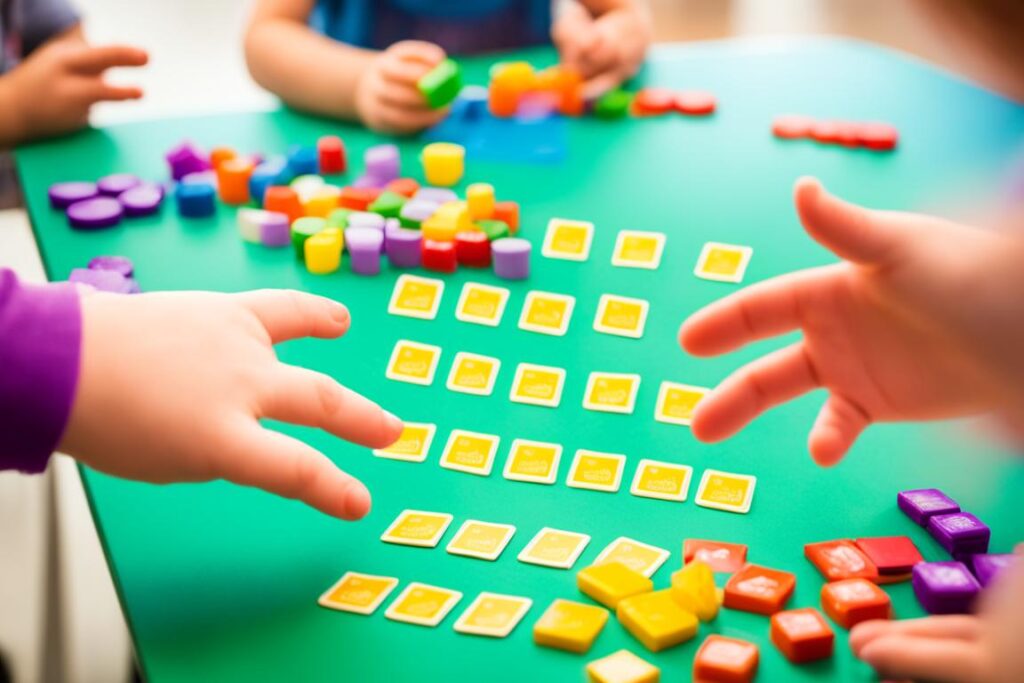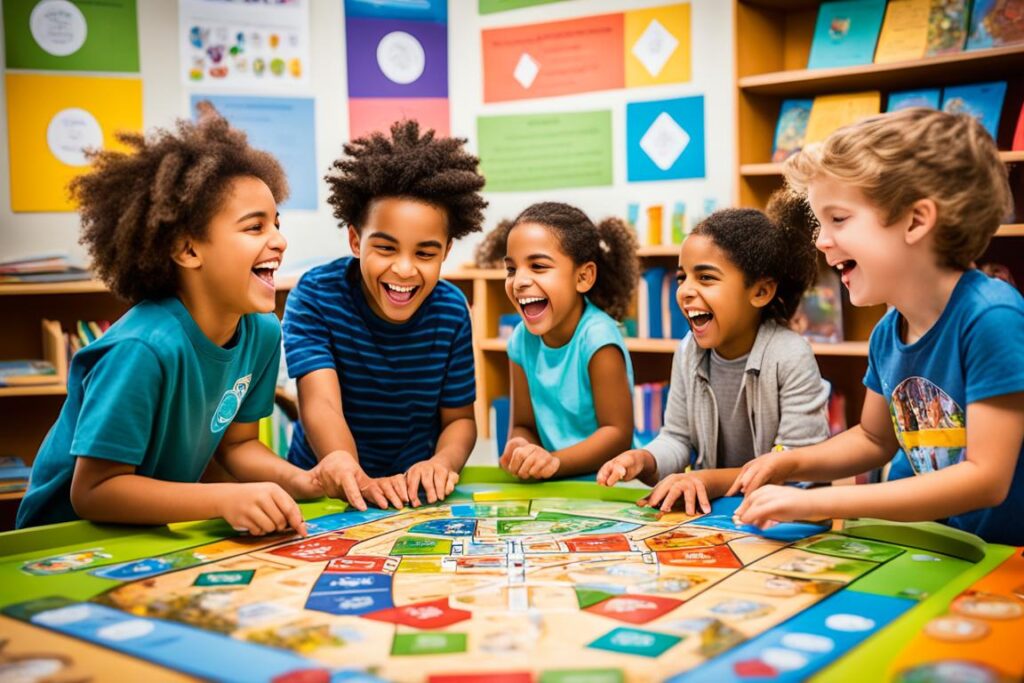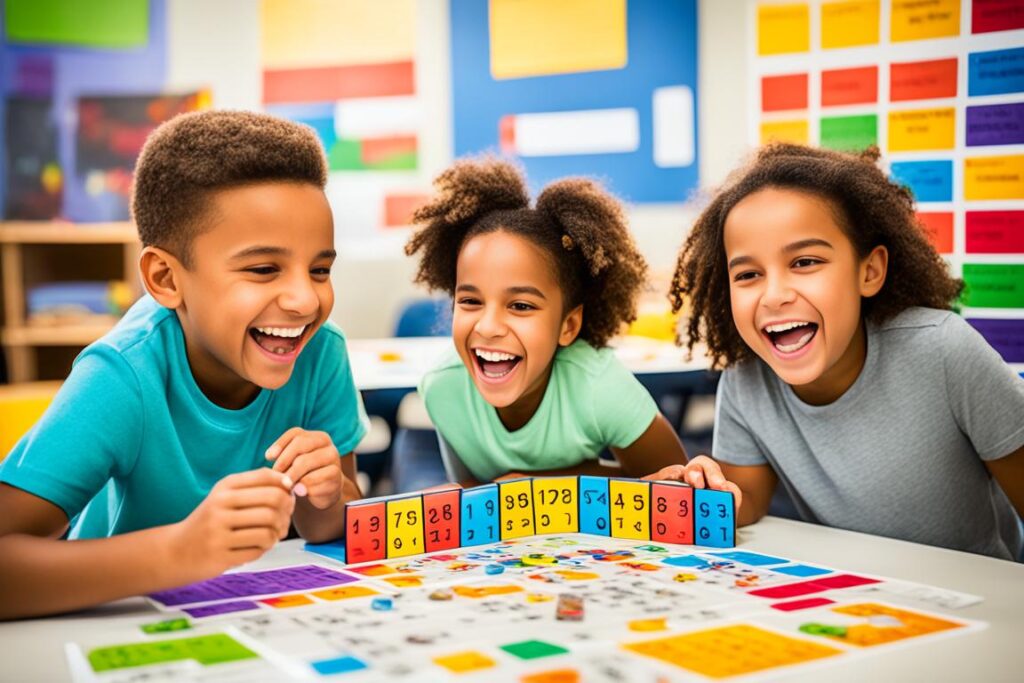Educational board games are a great way to keep learning fun for kids. They offer both fun and learning. This makes them a perfect tool for teachers and parents.
These games are great at making kids think creatively. They present unique challenges. This pushes kids to find new ways to solve problems. It boosts their critical thinking and imagination.
Also, educational board games help kids interact with others. They encourage teamwork and good communication. Kids also learn social skills. Plus, they learn important life skills like being a good sport and being patient.
They also boost brain power. Games that need deep thinking can improve how kids’ brains work. Playing these games can improve memory and how kids focus.
There are games for all ages. From simple games for little ones, to complex ones for older kids. There is something for everyone.
Key Takeaways:
- Educational board games make learning fun and engaging for children of all ages.
- These games promote creative thinking, social development, and cognitive function.
- Playing board games teaches valuable life skills such as teamwork and good sportsmanship.
- There is a wide variety of educational board games available for different age groups.
- By incorporating educational board games into learning, children can develop a love for education and engage actively in their learning journey.
Benefits of Play for Children’s Development
Play is key for children’s growth. It’s fun but also essential for many skills like creative thinking and social development.
Playing boosts creative thinking and imagination. It lets kids explore and try new things. This helps with problem-solving too.
Play is also crucial for making friends. It teaches kids skills like listening and empathy. So, whether playing with others or siblings, kids learn a lot.
Play can grow strategy skills by making kids think critically and solve problems.
In addition, play teaches kids about time management. Games with timers show the value of finishing tasks on time. This is useful in life.
Play supports brain health too. It works the part of the brain that does social skills and thinking. So, playing a lot makes kids smarter.
Overall, play is vital for kids. It helps with thinking, making friends, and even managing time. Including play in their day helps kids develop well-rounded skills.

The Importance of Social Play
Social play is crucial for kids. It helps them learn how to interact positively and gain vital skills for their growth. Educational board games are perfect for this. They make learning social skills fun and full of lessons.
Educational games offer a structured way to play socially. Children get to talk, work together, and have fun. This builds their social skills and helps them get along better with others.
When kids play games, they practice taking turns. This shows them why patience and respect are important. It also helps them listen better and be fair.
Learning to win and lose well is another lesson from these games. Kids start to understand empathy. They can be happy for others’ wins and keep a positive attitude, win or lose.
Strategy games are great for playing and learning together. Kids need to talk, plan, and help each other. This makes them better at talking, problem-solving, and thinking critically as a team.
“Educational board games not only provide a fun way for children to learn, but they also help improve their social skills. They teach turn-taking, good sportsmanship, and strategic thinking.” – Dr. Jane Thompson, Child Development Expert
In the end, social play is very important for kids. Educational board games help a lot. They make children better at socializing, sharing, and showing empathy. By playing together, kids learn crucial skills they’ll use for their whole lives. These skills include teamwork, good communication, and thinking together to solve problems.
| Benefits of Social Play with Educational Board Games |
|---|
| 1. Promotes positive social interactions |
| 2. Teaches turn-taking and patience |
| 3. Develops empathy and good sportsmanship |
| 4. Enhances communication and listening skills |
| 5. Encourages collaboration and cooperation |
| 6. Fosters problem-solving and critical thinking |

Conclusion
Educational board games are a great way for kids to have fun and learn. They help with creativity, social skills, and thinking ahead. These games also get children interested in learning for life.
These games are good for kids of all ages, including families. There are games for every subject like math, science, and history. They make learning fun and let kids interact and think hard.
Using play to learn is a smart idea. It mixes fun with learning to keep kids interested. Let’s use board games to make learning more than just studying. Let’s make it a journey that’s exciting and full of new discoveries.



